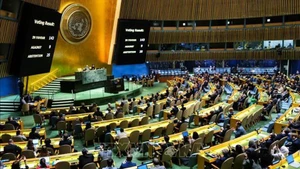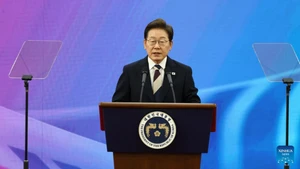United Nations Secretary-General Antonio Guterres has repeatedly affirmed that the two-state solution—Israel and Palestine living side by side in peace and security—is “the only viable path” to lasting peace in the region.
Thanks to the sustained efforts of various nations and international organisations, the two-state solution has been strongly revived, with around 150 countries worldwide now voicing support.
Most recently, at the 80th session of the United Nations General Assembly, French President Emmanuel Macron declared that Paris officially recognises the State of Palestine. Shortly beforehand, the UK, Canada, Australia and Portugal made similar announcements, marking a significant step forward in promoting peace in the Middle East.
Although not the first countries to recognise Palestine, the decisions of France and the UK have drawn particular international attention, signalling a shift in the stance of two major powers that had long been cautious about endorsing Palestinian statehood.
Moreover, as leading European nations and permanent members of the UN Security Council, Britain and France’s recognition of Palestine is expected to trigger a domino effect across Europe and beyond, amplifying support for the two-state solution.
This development provides an important foundation for Palestine to consolidate its legal and diplomatic standing, while also increasing pressure on the parties concerned to return to the negotiating table.
However, many analysts caution that recognition, though a “necessary” step, is not “sufficient” to realise the establishment of an independent Palestinian state, end decades of conflict, and bring peace to Gaza.
The ongoing brutal fighting, combined with the continued expansion of Jewish settlements in the West Bank, has rendered the prospects for a viable Palestinian state increasingly fragile. Israel, a direct party to the conflict, has on many occasions resolutely rejected the idea of an independent Palestinian state.
Furthermore, despite support from hundreds of countries, Palestine’s bid for full United Nations membership still hinges on approval from the UN Security Council.
To achieve full membership of the world’s largest multilateral body, Palestine requires at least nine out of 15 Security Council votes in favour and no vetoes from the five permanent members, including the US.
In reality, this remains a daunting challenge. Palestine formally applied in 2011, but its aspiration for full UN membership has yet to materialise.
Since the escalation of conflict in Gaza in October 2023, more than 60,000 Palestinians have been killed and hundreds of thousands displaced. Infrastructure has been devastated, and over 2 million people face daily hunger.
In the short term, recognition of Palestine by the UK, France and other Western countries is unlikely to bring about fundamental changes on the ground. Yet, this move is widely expected to generate significant diplomatic pressure, compelling the parties to reassess their approaches to the Middle East peace process.
















